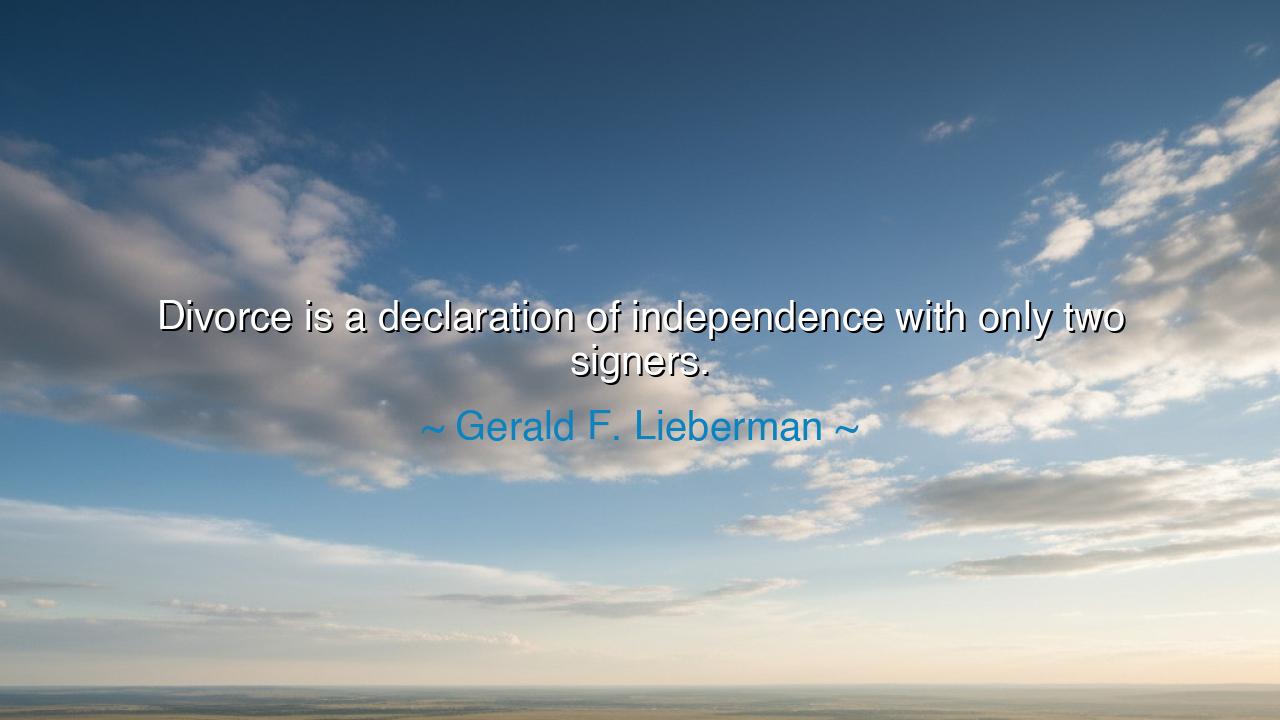
Divorce is a declaration of independence with only two signers.






Hear the piercing wit and hidden wisdom in the words of Gerald F. Lieberman, who once said: “Divorce is a declaration of independence with only two signers.” In this saying, both humor and truth intertwine, like sorrow and freedom walking hand in hand. It speaks of the ending of union, not as a failure alone, but as an act of liberation — the moment when two souls, once bound together in love, find the courage to unbind themselves in search of peace. Lieberman, known for his sharp humor, crafted this statement not as a mockery of marriage, but as a reflection of the profound truth that freedom often comes at the cost of breaking bonds once held sacred.
The origin of this quote lies in Lieberman’s keen understanding of the human condition. As an American writer and humorist, he often saw in the tragedies of ordinary life a reflection of deeper truths. When he compared divorce to a declaration of independence, he echoed the revolutionary spirit of those who, centuries earlier, had cast off tyranny in pursuit of self-rule. Just as a nation must sometimes break free from unjust rule to reclaim its destiny, so too must individuals sometimes separate from one another to regain their sovereignty of spirit. What was once a union of harmony can, with time and pain, become a prison — and to leave that prison is to sign one’s own name upon the document of rebirth.
In this image of “two signers,” Lieberman captures both the tragedy and symmetry of separation. For divorce is not an act of one, but of two — two who once swore unity, now agreeing to part. It is a mutual recognition that the shared dream has ended, and that each must walk a separate path. The comparison to the Declaration of Independence reminds us that freedom, though noble, is never simple. When the thirteen colonies broke from Britain, they did not do so lightly; their declaration was a solemn acknowledgment of irreconcilable differences, followed by years of struggle and sacrifice. Likewise, divorce, though it may promise peace, often brings with it conflict, grief, and the long labor of rebuilding. Yet in both, the same flame burns — the unyielding human desire to live freely, even when freedom comes with pain.
Consider the story of Eleanor Roosevelt, who, though never divorced, endured a marriage strained by infidelity and distance. In her later years, she found her own form of independence, not through the breaking of legal bonds, but through the pursuit of personal purpose. Her transformation — from the quiet wife of a powerful man to a voice for human rights and justice — mirrors the truth Lieberman spoke of. For divorce, whether literal or spiritual, is the moment when one claims the right to one’s own life again, when silence gives way to self-expression, and duty gives way to destiny. To separate is not to hate; it is to recognize that some journeys can no longer be walked together.
Yet Lieberman’s quote carries not only wisdom but warning. Independence is a noble word, but it demands responsibility. Just as the young United States, having won freedom, had to learn how to govern itself, so too must those newly freed from union learn to master their own hearts. Freedom without reflection leads to chaos; independence without compassion leads to isolation. The wise must therefore temper their freedom with understanding — to part without bitterness, to let go without scorn, to rebuild without resentment. The end of a union need not be the death of love’s memory; it can be, instead, the rebirth of dignity.
The ancients, too, knew this truth. They taught that the soul, when shackled to what no longer nourishes it, withers like a vine without sun. To sever that bond — be it with a ruler, a lover, or a past self — is to begin again in the light. But they also taught that freedom must be earned, not seized in anger but embraced in wisdom. Divorce, then, is not merely an act of escape, but a passage through fire — a test of character that reveals whether one seeks liberty for its own sake, or as a doorway to growth.
So let this be the lesson: when love falters and union fails, let the declaration of independence not be written in spite, but in truth. Let each signer walk away not as victor or victim, but as one who has rediscovered the sacred duty to the self. Remember, freedom is not the opposite of love — it is love’s evolution, the point at which compassion turns inward and becomes the courage to begin anew. As Lieberman’s words remind us, every ending carries within it the seed of rebirth, and every separation, when embraced with grace, becomes a return to the most enduring union of all — the union between one’s heart and one’s independence.






AAdministratorAdministrator
Welcome, honored guests. Please leave a comment, we will respond soon